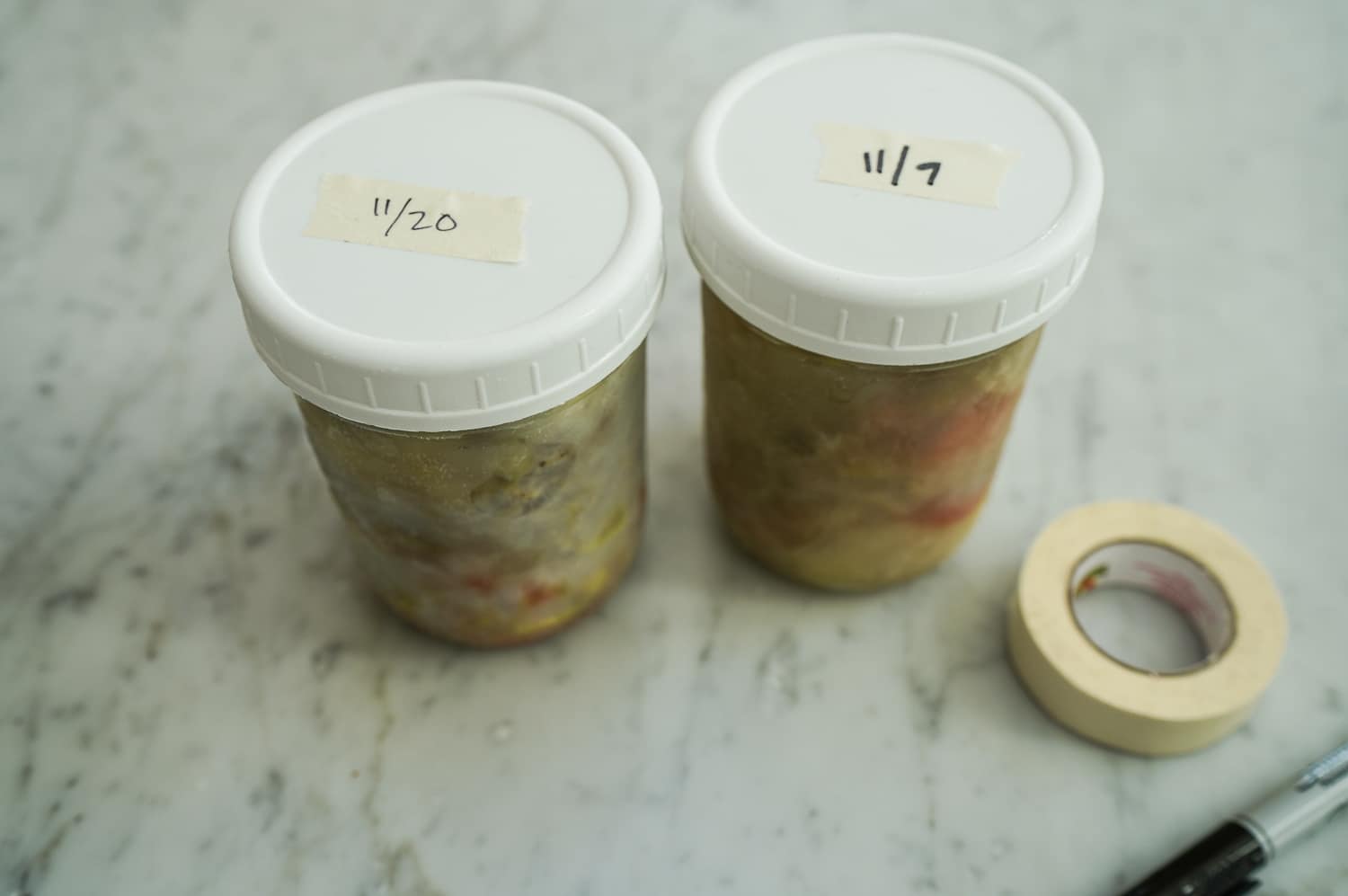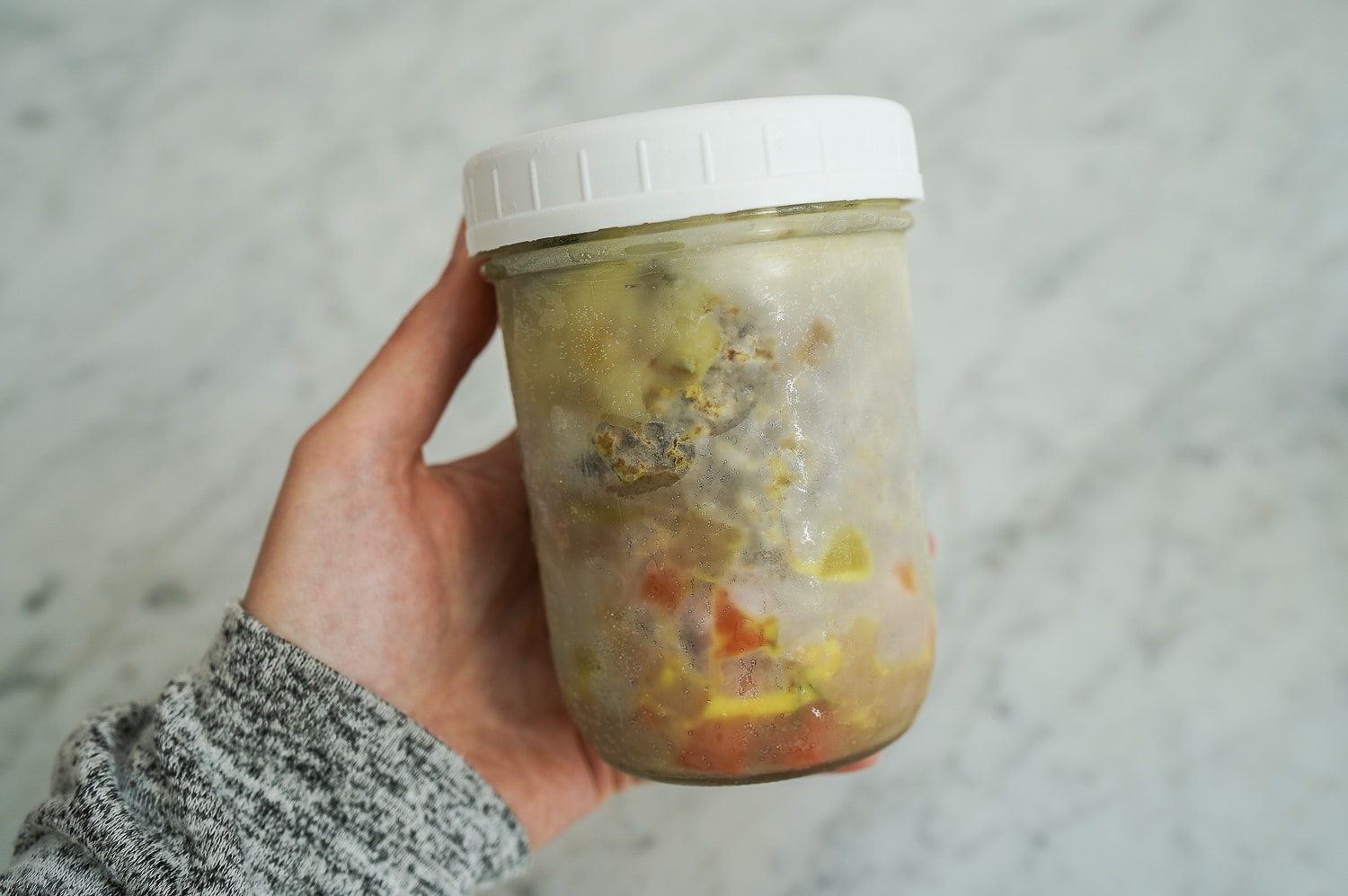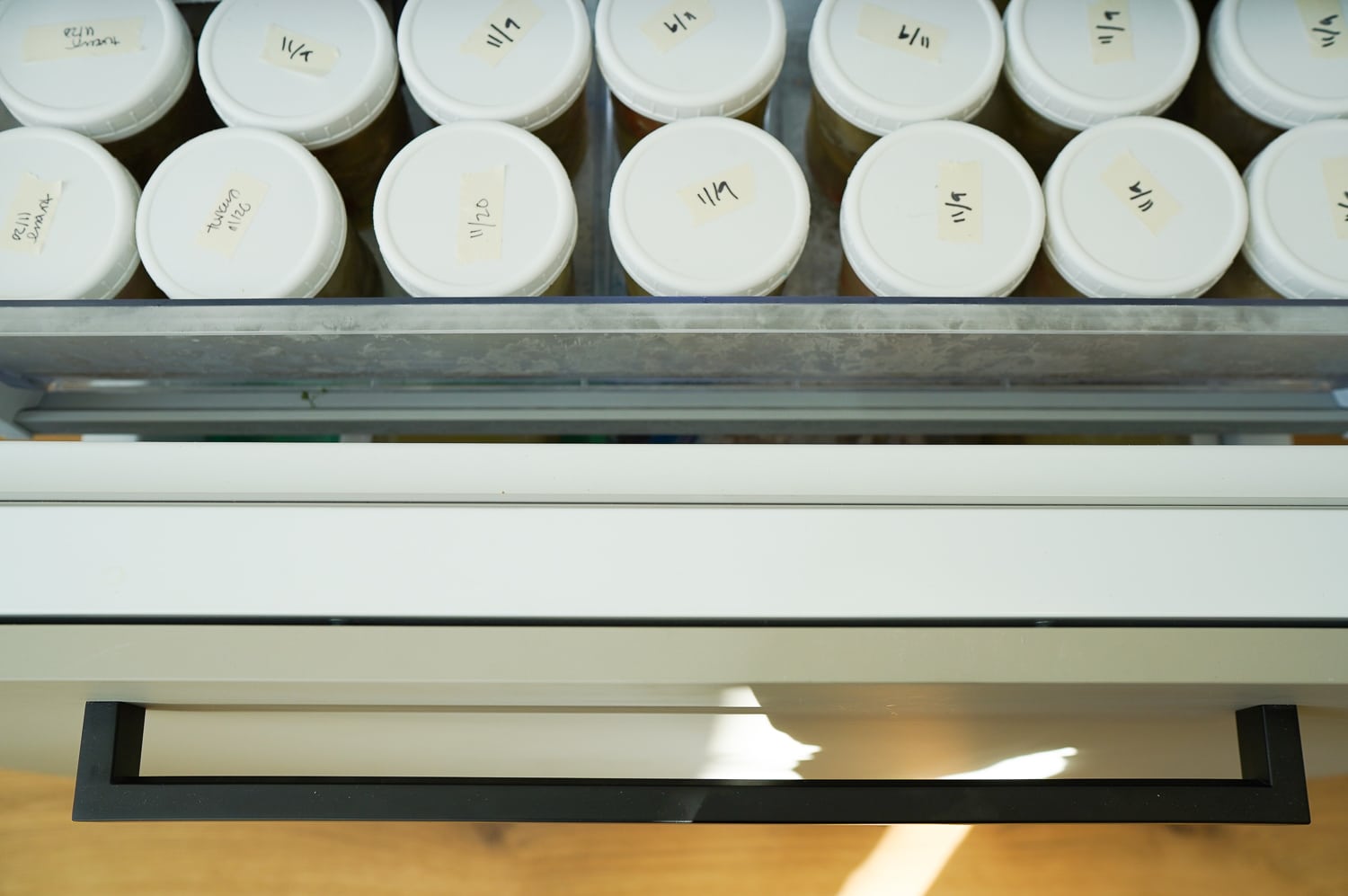
Today we are going to talk all about one of the most overlooked assets in an AIP kitchen – a freezer! Even if all you have access to is the average freezer section of your kitchen unit, today I’m going to show you how cooking to freeze can make your AIP implementation that much easier. Let’s dive in!
Why would you cook and store meals in your freezer?
One of the first reactions people have when they learn about the Autoimmune Protocol is how much cooking is involved. Seriously, this way of cooking calls for a LOT of cooking! Transitioning your diet to include no processed or convenience foods means you are going to be doing most or all of that processing and cooking yourself.
Before you panic… freezer cooking can help make your AIP lifestyle easier by enabling you to:
- Bank serving-size portions of complete meals to defrost or heat-and-eat when time is short, in cases of “food emergencies,” or to eat during autoimmune flares
- Store prepped ingredients or meal components to use in future recipes (like broths and sauces)
- Reduce repetition of leftovers and increase variety in day-to-day meals (instead of chicken soup for dinner 6 nights in a row, you can bank 4 of those servings to enjoy randomly over the next few months)
- Preserve the nutrient-density of seasonal ingredients and being able to access them at other times of the year (such as freezing an AIP pesto with fresh basil in the summer to be eaten during the winter)
- Reduce food waste by freezing uneaten leftovers before they go bad
- For those who are sensitive, reduce histamines in cooked foods (to read more about this topic, check out my article AIP and Histamine Intolerance)
Even though most of us have access to a freezer, I am betting not every one of them is being used to its fullest potential! It isn’t as simple as just tossing stuff in your freezer, though–there are some considerations you’ll need to make, like picking compatible recipes, preparing them properly, and storing them in the right containers to maintain freshness and minimize waste. Read on to learn more about all of these topics and set yourself up for success in using your freezer!
What types of meals do well frozen and reheated?
First off–not every type of meal or prepped ingredient does well in the freezer! Among foods that do not freeze well are delicate raw greens (like salad), dishes containing gelatin, and fried or crispy foods (the moisture from the freezing and defrosting process makes them go soggy). Cooked seafood also does not lend itself to freezing well, as the reheating process can make it tough and rubbery.
Foods that freeze the very best are soups, stews, and sauces (this is because the liquid protects the dish from freezer burn). Pureés, like paté or blended vegetables, also do quite well. Many raw fruits and vegetables do well prepped and frozen (besides delicate lettuces and greens), as well as cooked meats and vegetable dishes–as long as they are stored properly, which we’ll talk about later. Desserts can be well-suited for the freezer, as long as they don’t contain gelatin or too much coconut cream (the freezing and thawing process can change the texture in some recipes).
To get you started, here are some of my favorite AIP recipes that freeze exceptionally well and make perfect additions to a freezer-cooking routine
Soups/Stews
Main Dishes
Broths/Sauces
Vegetable Sides
Other Recipes
If you are looking for more freezer-friendly AIP recipes, be sure to check out the ebook Freezer Cooking for the Paleo AIP, developed specifically for this purpose by bloggers in the AIP community!
It should be noted that you want to make sure if your recipe calls for meat, you will want to make sure it is fully cooked before freezing (thawing raw meat and then freezing it again before cooking is not a good food safety practice).
What is the best way to reheat frozen food?
You can reheat frozen food in a variety of ways:
- Use a microwave to heat thawed or fully-frozen meals (If you’d like to read a scientific article about safety, The Paleo Mom has an excellent article Are Microwaves Safe to Use?)
- Thaw and then heat covered in the oven (around 300 degrees)
- Thaw and then heat on low in a saucepan (for a soup, stew, or sauce)
- Thaw and then heat on low in a skillet (for meat and vegetable sides)
Personally, I don’t own a microwave (not because I’m concerned about safety–I don’t like how microwaves heat food unevenly, and I don’t want to dedicate the counter space in my kitchen), so I use one of the latter three methods depending on the dish.
For thawing, you have a couple of options. If you are planning ahead, you can pull a portion out of the freezer 24-48 hours before you intend to eat it, allowing plenty of time to fully thaw before reheating. You can also take it out of the freezer same-day and thaw in cold water for a few hours. The only time I recommend thawing with warm water is when you are going to consume immediately (I call this a “quick thaw”).
How long does food keep frozen and how do you prevent freezer burn?
According to the USDA, frozen food lasts indefinitely from a food safety perspective, but flavor and texture are diminished over time.
My experience is that frozen meals and components taste their best when they are used within 2-3 months of cooking. Broth lasts a little longer, 3-6 months. I recommend keeping a freezer inventory and labelling every meal with a date to prevent waste. (And to be clear–don’t be afraid to eat those meals that are on the older side. I have definitely eaten meals and components that got accidentally hidden in the freezer for a year or more–no waste!).
Freezer burn is caused by air coming into contact with your frozen food. The best way to prevent it is by minimizing air contact in how you store your meals. My preference is to cook mostly soups, stews, broths, and pureés and store them in wide-mouth Mason jars (discussed below) to minimize air space and freezer burn. Others use plastic or silicone bags to store food in their freezer with as little air space as possible.
What kind of storage containers do you need?
There are lots of options for storage containers when cooking to store meals and components in your freezer, each with pros and cons. Here is a list of some options:
- Glass, wide-mouth mason jars – these are my ABSOLUTE favorite for freezing any type of soup, stew, broth, or sauce. I like them because the glass is non-reactive and durable, they are a close average portion for a meal, they fill space efficiently, and they are easy to label and see what is inside. CAUTION: You must get wide-mouth jars WITHOUT shoulders and cool your food properly for them to not crack in your freezer (discussed below).
- BPA-free plastic lids for the wide-mouth mason jars – These are much more handy, durable, and clean better than the metal canning lids that come with the jars.
- Portion-size glass or BPA-free plastic containers – another option for storing portioned meals, or those types of meals that do not transfer well to jars.
- Silicone trays (cube and large-size) – these can be helpful for freezing small portions of sauces or reduced broth that then can be transferred into silicone or plastic bags for long-term storage.
- Silicone bags – these can be helpful for storing items that don’t fit well in jars or portion-size containers (like bones or vegetable scraps for making broth).
- Plastic bags – I try to use these as minimally as possible, but sometimes they are the best solution available (especially since you can squeeze most of the air out of them before closing). Use them for storing raw or prepped fruits and vegetables (like berries).
How do you best prepare food for freezer storage?
If you want your frozen food to be as flavorful as possible and to keep as well as possible, there are a few steps you’ll want to take in order to make sure that happens:
- Cool your food slowly! This applies especially if you will be freezing in glass containers, but make sure your food is cooled to room temperature, refrigerated first, and then placed in the freezer. The more quickly your food goes from flaming hot to frozen, the more expansion will occur, which is a sure way to break those glass containers! ALWAYS ensure your meals are fully chilled to refrigerator temperature before placing in the freezer (and never, EVER freeze in a container with a “shoulder,” or an area that will not allow the liquid to expand – if you use glass, it will crack!).
- Let soups, stews, and sauces sit in the refrigerator overnight before freezing. You know how soup always tastes better the second day? That is because the flavors have had time to mix and disperse a bit. By waiting a day you not only ensure your food is properly cooled, but you will have a tastier product in the freezer to enjoy later.
- Label everything. Even if you are using clear containers and think you will be able to remember the contents of a container or jar, label it with the date! This freezer tape is my favorite. The more organized you are with your labeling and placing new items in the back of your freezer, the more likely you are to use the oldest items first and prevent items from going too long without being eaten. If you want to be extra organized, keep a freezer inventory and check in with it on a monthly basis to make sure everything is getting used up on time.

What if I just want to buy some frozen foods to stock my freezer?
There are some excellent companies who make frozen AIP meals that are delivered to your door. If you want to stock your freezer with some great options be sure to look into these companies that make either some or all AIP-friendly options (always be sure to check ingredients!):
I hope this article has given you some courage to use your freezer more effectively, especially if you’ve been hesitant to put it to use while transitioning to a new way of eating!
Tell me–have you been using your freezer to make your AIP lifestyle easier, and if so what is your favorite recipe to cook for the freezer? What do you always have on hand in case of a “food emergency”? I’d love to know!

















8 comments
Hello Mickey and Angie , Thank you so much for the wonderful information. I have Graves
and I don’t sleep well and hair loss. My endocrinologist proscribed Progesteron she said it will help with sleep and hair loss. I’m very careful what I put in my body like food supplements, and meds. Can you tell me if you think is safe to take Progesterone? I will truly appreciate an answer. I’m desperate
Thank you so much
Sarah
Hi Sarah-
We aren’t medical providers and can’t answer questions about the safety of the progesterone. I would speak w/ your endocrinologist about your concerns.
Hi, would you be able to comment at some point about the COVID-19 V, and whether or not it is advised to get the V? Is this information known? I have seen some info that says autoimmune persons should not get the V, but does that only apply to people who are taking immune suppressing drugs? What about people with something like Hashimotos? (not taking drugs)? Any info would be appreciated!
Hi Mary Ellen! Thanks for your question. Unfortunately as non-medical practitioners we’re not qualified to give you this kind of advice. I do hope we are able to have our medical director, Dr. Abbott address this for the community soon.
Thank you for this awesome resource! So helpful to have to prep on my days off!
I’m so happy you found it helpful Chrissy!
This was such an informative read. I’ve always felt a bit hesitant with freezing meals, but after reading this I think I’m going to give it a whirl. Thanks a million! 😊
I’m happy it inspired you Tracy!